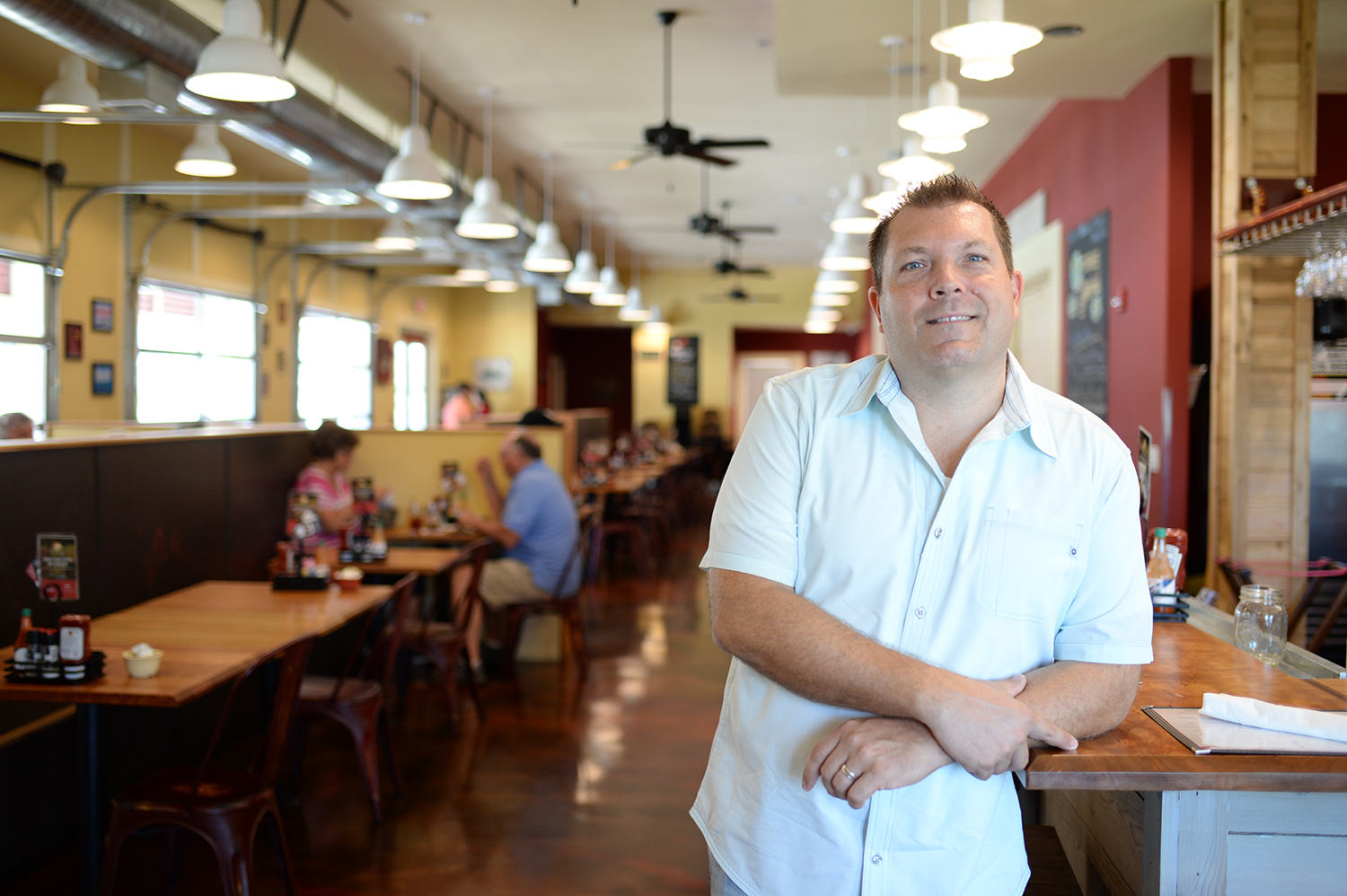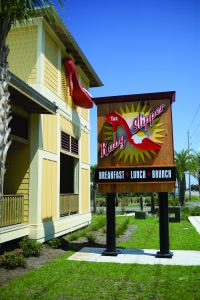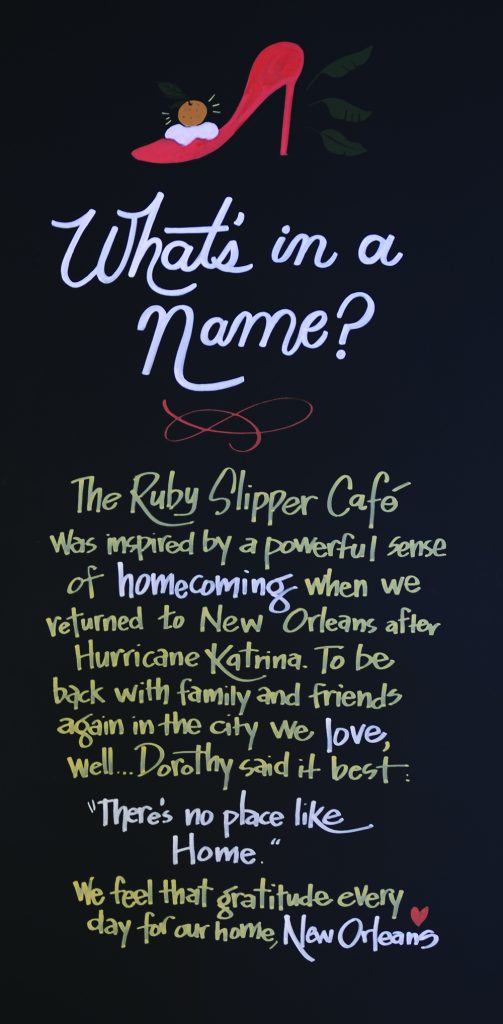 It’s taken nearly 20 years, but Erich Weishaupt has found his way back home.
It’s taken nearly 20 years, but Erich Weishaupt has found his way back home.
Weishaupt, ’97 electrical engineering, is the owner of The Ruby Slipper Café, and in June 2016 he opened his sixth location with a restaurant in Orange Beach. But his journey back to Sweet Home Alabama has been an unconventional one for an engineer.
Weishaupt lived in Opelika as a child and spent many of his adolescent years in Selma before he arrived at Auburn. His mother attended the university and his father even taught some courses, so the 100-mile trek to the university was a no-brainer.
“When I was a kid, that’s when I fell in love with Auburn,” Weishaupt said. “I had no doubt where I wanted to go to school.”
As a child, he loved science and math and showed an early interest in electronics. So, it was only a natural fit when he chose electrical engineering as a major.
“I loved the community within Broun Hall and the entire electrical engineering department,” Weishaupt said. “Everybody was always in it together.”
During his senior year at Auburn, representatives from Schlumberger were recruiting on campus, and he jumped at the opportunity to work for the Fortune 500 oilfield services company.
“It was a great job coming out of college,” he said.
During his tenure with Schlumberger, Weishaupt even worked on the now infamous Deepwater Horizon rig years prior to the 2010 explosion. In 2003, after seven years with Schlumberger, Weishaupt decided it was time to leave to take on a new adventure.
While working for Schlumberger in New Orleans, Weishaupt met and married his wife, Jennifer, who also happened to be an engineer working in the city for Shell. In addition to falling in love with Jennifer, he also fell in love with the architecture of New Orleans, and he began flipping houses in his spare time. As he started to make enough money with his side gig to make it a full-time job, he decided to make a leap of faith.
“It was a momentous decision,” Weishaupt said. “I felt passionate about real estate and it gave me the opportunity to be an entrepreneur.
“And then Katrina hit.”
A business is born
 Being in real estate has its ups and downs and unexpected turns, but nothing could prepare Weishaupt for what was ahead when he embarked on his real estate career. Just two years after making the decision to leave Schlumberger for his newfound passion, Hurricane Katrina made landfall on the southeast Louisiana coast, destroying thousands of homes in New Orleans. Weishaupt wasn’t immune to the devastation, as his own home was affected by the torrential storm.
Being in real estate has its ups and downs and unexpected turns, but nothing could prepare Weishaupt for what was ahead when he embarked on his real estate career. Just two years after making the decision to leave Schlumberger for his newfound passion, Hurricane Katrina made landfall on the southeast Louisiana coast, destroying thousands of homes in New Orleans. Weishaupt wasn’t immune to the devastation, as his own home was affected by the torrential storm.
But as he had always done, he got right back to work to rebuild the community he called home. He took leadership roles in neighborhood meetings, and helped devise plans to build back this once beautiful city.
“Katrina changed everything,” Weishaupt said. “It forced a lot of new ideas into New Orleans. There were a lot of absentee landlords and this forced their hands to either renovate or sell the property.”
In addition to this major life event for the Weishaupts, they also found out just two weeks after Katrina that they were expecting their first child.
“No matter how much you plan for life, you can’t overcome where life leads you,” Weishaupt said with a laugh.
Over time, Weishaupt renovated more than a dozen homes in his six-block by six-block neighborhood before he was approached regarding a seedy property – a convenience store – that was a cancer on the community. The store was a haven for drug activity and loitering, bringing nothing but trouble. A couple living next to the establishment wanted to rid the neighborhood of the store, and they did just that when the building’s owner agreed to sell as long as they paid pre-hurricane market price for the property. The couple and the Weishaupts had previously spoken about the need for a restaurant in the neighborhood, so the pair confronted Weishaupt about the idea.
“I told them that we didn’t say ‘we’ wanted to open a restaurant, we said we wanted ‘somebody’ to open a restaurant,” Weishaupt said jokingly.
But, as he had done with his real estate venture, he took a leap of faith into the world of restaurants.
“We had heard all the horror stories of opening a restaurant, but there was a need in the neighborhood. It really needed something after Katrina, a community gathering place. We were traveling all over the city to get good breakfast,” Weishaupt said.
So, what did he do?
“Me and my wife, being engineers of course, the first thing we did was look up ‘how to open a restaurant’ on the internet,” Weishaupt said with a laugh. “We found a website called RestaurantOwner.com and we downloaded the Excel spreadsheet with step-by-step instructions and started tearing everything apart.”
 The Weishaupts took elements from their travels to create the menu, and in 2008 The Ruby Slipper Café was born. But why the name? When discussing possibilities, Jennifer came up with the idea after hearing a local radio host share a recent experience she had with her daughter, who was returning to New Orleans after living in Houston for several years.
The Weishaupts took elements from their travels to create the menu, and in 2008 The Ruby Slipper Café was born. But why the name? When discussing possibilities, Jennifer came up with the idea after hearing a local radio host share a recent experience she had with her daughter, who was returning to New Orleans after living in Houston for several years.
“She said she realized that when you grow up in New Orleans, everywhere else is just Kansas. New Orleans is Oz,” Weishaupt said. “That’s who we are. Even though I’m not a native of New Orleans, if you were here before Katrina and came back to help rebuild, you are a true New Orleanian.”
Within two months of opening the restaurant, the couple realized their success was causing them to outgrow the location. So, they decided to try and re-create the idea and began scouting for an additional location. They found a spot in the Central Business District, renovated the vacant space and opened in December 2010. And again, within just a few months, he realized they were also outgrowing this facility. To this day, he said the Central Business District restaurant is the busiest they own.
After opening the second location, Weishaupt said they began developing and honing their systems and processes, eventually leading him to open two more restaurants in New Orleans. That success and growth led him to open his first out-of-state restaurant with the location in Pensacola, Florida. And as his business grew, so did his family.
“The second location coincided with the birth of our second son and we opened the third location shortly after the birth of my daughter. So when we announced that we were opening our fourth New Orleans location, my parents asked, ‘Is this your way of saying Jennifer’s pregnant?’ he said with a laugh.
To help him with his transition from a traditional engineering profession to building a career as an entrepreneur, he enrolled in the Goldman Sachs 10,000 Small Businesses program, which he said helped him create and focus on a five-year growth plan. Part of that plan was the creation of a commissary kitchen to keep everything fresh and consistent across all locations.
“Replicating recipes at each restaurant is not as scientific as a lot of the engineering background I came from. We use all fresh ingredients, made in house, and that has really helped with our brand recognition. Everything is really consistent,” Weishaupt said.
After opening the Pensacola location, Weishaupt decided to open one more restaurant. This location would be the first of his six to be built as a new structure, and it would be back home in the state he grew up in.
“We wanted to be somewhere we could still travel to, somewhere we could we put the kids in the car and be there within two DVD movies time, and I thought being on the beach would be great. We proved our concept worked in Pensacola, so I thought Orange Beach was a great fit,” Weishaupt said.
So does he have plans to keep expanding on the Gulf Coast, or beyond?
“I keep saying I’m ready for a break,” Weishaupt said. “There’s the issue of whether to franchise or not franchise. I don’t want to just own a restaurant, I want to own a restaurant I can be proud of.”
While some people questioned him when he left a career in the oil industry for the unknown, he said he would have never been able to make the smooth transition and achieve the success he has without his engineering training.
“When I first told my parents, they said, ‘Well, great, we’re glad we put you through engineering school so you could do real estate,’” he said.
“But I wouldn’t have been able to achieve what I’ve been able to achieve without that background. Engineering teaches you how to solve problems. You’re not going to know the answer to everything, but if you know how to get the answer and research and problem-solve and make good decisions, that will carry you a long way and that’s what I have carried with me. That has stuck with me my entire life,” Weishaupt said.